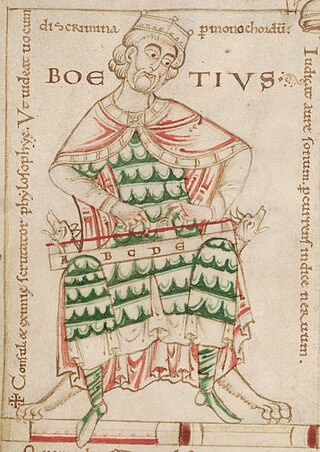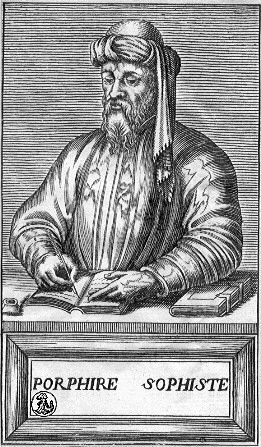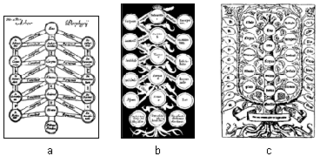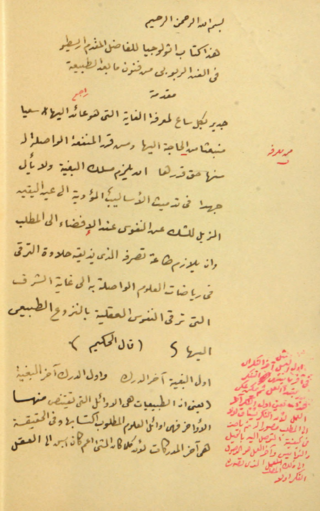Related Research Articles

Pseudo-Dionysius the Areopagite was a Greek author, Christian theologian and Neoplatonic philosopher of the late 5th to early 6th century, who wrote a set of works known as the Corpus Areopagiticum or Corpus Dionysiacum.

Scholasticism was a medieval school of philosophy that employed a critical organic method of philosophical analysis predicated upon the Aristotelian 10 Categories. Christian scholasticism emerged within the monastic schools that translated scholastic Judeo-Islamic philosophies, and thereby "rediscovered" the collected works of Aristotle. Endeavoring to harmonize his metaphysics and its account of a prime mover with the Latin Catholic dogmatic trinitarian theology, these monastic schools became the basis of the earliest European medieval universities, contributing to the development of modern science; scholasticism dominated education in Europe from about 1100 to 1700. The rise of scholasticism was closely associated with these schools that flourished in Italy, France, Portugal, Spain and England.

Anicius Manlius Severinus Boethius, commonly known simply as Boethius, was a Roman senator, consul, magister officiorum, polymath, historian, and philosopher of the Early Middle Ages. He was a central figure in the translation of the Greek classics into Latin, a precursor to the Scholastic movement, and, along with Cassiodorus, one of the two leading Christian scholars of the 6th century. The local cult of Boethius in the Diocese of Pavia was sanctioned by the Sacred Congregation of Rites in 1883, confirming the diocese's custom of honouring him on the 23 October.{

Aristotelianism is a philosophical tradition inspired by the work of Aristotle, usually characterized by deductive logic and an analytic inductive method in the study of natural philosophy and metaphysics. It covers the treatment of the social sciences under a system of natural law. It answers why-questions by a scheme of four causes, including purpose or teleology, and emphasizes virtue ethics. Aristotle and his school wrote tractates on physics, biology, metaphysics, logic, ethics, aesthetics, poetry, theatre, music, rhetoric, psychology, linguistics, economics, politics, and government. Any school of thought that takes one of Aristotle's distinctive positions as its starting point can be considered "Aristotelian" in the widest sense. This means that different Aristotelian theories may not have much in common as far as their actual content is concerned besides their shared reference to Aristotle.

The Organon is the standard collection of Aristotle's six works on logical analysis and dialectic. The name Organon was given by Aristotle's followers, the Peripatetics, who maintained against the Stoics that Logic was "an instrument" of Philosophy.

Porphyry of Tyre was a Neoplatonic philosopher born in Tyre, Roman Phoenicia during Roman rule. He edited and published The Enneads, the only collection of the work of Plotinus, his teacher.

Gilbert de la Porrée, also known as Gilbert of Poitiers, Gilbertus Porretanus or Pictaviensis, was a scholastic logician and theologian and Bishop of Poitiers.
John Scotus Eriugena, also known as Johannes Scotus Erigena, John the Scot, or John the Irish-born was an Irish Neoplatonist philosopher, theologian and poet of the Early Middle Ages. Bertrand Russell dubbed him "the most astonishing person of the ninth century". The Stanford Encyclopedia of Philosophy states that he "is the most significant Irish intellectual of the early monastic period. He is generally recognized to be both the outstanding philosopher of the Carolingian era and of the whole period of Latin philosophy stretching from Boethius to Anselm".

The Porphyrian tree or Tree of Porphyry is a classic device for illustrating a "scale of being", attributed to the 3rd century CE Greek neoplatonist philosopher and logician Porphyry, and revived through the translations of Boethius.
Boetius de Dacia, OP was a 13th-century Danish philosopher.
Remigius (Remi) of Auxerre was a Benedictine monk during the Carolingian period, a teacher of Latin grammar, and a prolific author of commentaries on classical Greek and Latin texts. He is also accredited with collecting and compiling other early medieval thinkers' commentaries on these works.

The Theology of Aristotle, also called Theologia Aristotelis is a paraphrase in Arabic of parts of Plotinus' Six Enneads along with Porphyry's commentary. It was traditionally attributed to Aristotle, but as this attribution is certainly untrue it is conventional to describe the author as "Pseudo-Aristotle". It had a significant effect on early Islamic philosophy, due to Islamic interest in Aristotle. Al-Kindi (Alkindus) and Avicenna, for example, were influenced by Plotinus' works as mediated through the Theology and similar works. The translator attempted to integrate Aristotle's ideas with those of Plotinus — while trying to make Plotinus compatible with Christianity and Islam, thus yielding a unique synthesis.
In the history of logic, the term logica nova refers to a subdivision of the logical tradition of Western Europe, as it existed around the middle of the twelfth century. The Logica vetus referred to works of Aristotle that had long been known and studied in the Latin West, whereas the Logica nova referred to forms of logic derived from Aristotle's works which had been unavailable until they were translated by James of Venice in the 12th century. Study of the Logica nova was part of the Renaissance of the 12th century.
Neoplatonism was a major influence on Christian theology throughout Late Antiquity and the Middle Ages in the East, and sometimes in the West as well. In the East, major Greek Fathers like Basil, Gregory of Nyssa and Gregory of Nazianzus were influenced by Platonism and Neoplatonism, but also Stoicism often leading towards asceticism and harsh treatment of the body, for example stylite asceticism. In the West, St. Augustine of Hippo was influenced by the early Neoplatonists Plotinus and Porphyry. Later on, in the East, the works of the Christian writer Pseudo-Dionysius the Areopagite, who was influenced by later Neoplatonists such as Proclus and Damascius, became a critical work on which Greek church fathers based their theology, like Maximus believing it was an original work of Dionysius the Areopagite.

The transmission of the Greek Classics to Latin Western Europe during the Middle Ages was a key factor in the development of intellectual life in Western Europe. Interest in Greek texts and their availability was scarce in the Latin West during the Early Middle Ages, but as traffic to the East increased, so did Western scholarship.
The Isagoge or "Introduction" to Aristotle's "Categories", written by Porphyry in Greek and translated into Latin by Boethius, was the standard textbook on logic for at least a millennium after his death. It was composed by Porphyry in Sicily during the years 268–270, and sent to Chrysaorium, according to all the ancient commentators Ammonius, Elias, and David. The work includes the highly influential hierarchical classification of genera and species from substance in general down to individuals, known as the Tree of Porphyry, and an introduction which mentions the problem of universals.

Commentaries on Aristotle refers to the great mass of literature produced, especially in the ancient and medieval world, to explain and clarify the works of Aristotle. The pupils of Aristotle were the first to comment on his writings, a tradition which was continued by the Peripatetic school throughout the Hellenistic period and the Roman era. The Neoplatonists of the Late Roman Empire wrote many commentaries on Aristotle, attempting to incorporate him into their philosophy. Although Ancient Greek commentaries are considered the most useful, commentaries continued to be written by the Christian scholars of the Byzantine Empire and by the many Islamic philosophers and Western scholastics who had inherited his texts.
Neoplatonism is a version of Platonic philosophy that emerged in the 3rd century AD against the background of Hellenistic philosophy and religion. The term does not encapsulate a set of ideas as much as a series of thinkers. Among the common ideas it maintains is monism, the doctrine that all of reality can be derived from a single principle, "the One".

Medieval philosophy is the philosophy that existed through the Middle Ages, the period roughly extending from the fall of the Western Roman Empire in the 5th century until after the Renaissance in the 13th and 14th centuries. Medieval philosophy, understood as a project of independent philosophical inquiry, began in Baghdad, in the middle of the 8th century, and in France and Germany, in the itinerant court of Charlemagne in Aachen, in the last quarter of the 8th century. It is defined partly by the process of rediscovering the ancient culture developed in Greece and Rome during the Classical period, and partly by the need to address theological problems and to integrate sacred doctrine with secular learning. This is one of the defining characteristics in this time period. Understanding God was the focal point of study of the philosophers at that time, Muslim and Christian alike.
Pseudo-Augustine is the name given by scholars to the authors, collectively, of works falsely attributed to Augustine of Hippo. Augustine himself in his Retractiones lists many of his works, while his disciple Possidius tried to provide a complete list in his Indiculus. Despite this check, false attributions to Augustine abound.
References
Citations
- ↑ According to the Stanford Encyclopedia of Philosophy, : 'An anonymous paraphrase of the Categories falsely attributed to Augustine and traditionally known as Categoriae Decem has survived only because it was widely read and used in the early Middle Ages.'
- ↑ See, for example, this PDF Archived 2007-07-23 at the Wayback Machine , p.34.
- ↑ A.Arlig's unpublished Ohio PhD thesis, 'A study in early medieval Mereology' Archived 2007-09-27 at the Wayback Machine , note p.34, describes its popularity in the ninth and tenth centuries. It was glossed by Heiric, this PDF, note p.30.
- ↑ The Stanford Encyclopedia of Philosophy describes the work as ‘neoplatonic’; it also states 'In the early Middle Ages, Neoplatonic works such as the Categoriae decem were very important'.
- ↑ 'It seems to have been Alcuin who introduced both Boethius' discussions of logic and the Categoriae Decem into general circulation in the Frankish kingdom, or at least, it is in his writings that the earliest extant evidence of these works being read is to be seen'. Rosamond McKitterick, The Frankish Kingdoms under the Carolingians (1983), p.287. On p.286 she includes Ratramnus of Corbie with those knowing Aristotle through the work.
- ↑ Edited in J-P. Migne, Patrologia Latina
- ↑ S.Haverkamp, 'Making something of Nothing: the Content and Context of Fredegisus of Tours' 'De substantia nihili et tenebrarum' Archived November 2, 2013, at the Wayback Machine , unpublished thesis, Utrecht 2006 ,
- ↑ Eriugena's synthesis began with Dionysius' two branches of theology: apophatic and cataphatic. Apophasis was then considered from the perspective of the ten categories of Aristotle, interpreted through Augustine and the ps.-Augustinian Categoriae decem. ( p.23)
- ↑ Archived October 9, 2016, at the Wayback Machine , reference to John Marenbon, ‘John Scottus and the “Categoriae decem”’, in Werner Beierwaltes (ed.), Eriugena: Studien zu seinen Quellen, Vorträge des III. Internationalen Eriugena-Colloquiums, Freiburg im Breisgau, 27.–30. August 1979
- ↑ Marenbon (2003), Ch. 9.
Bibliography
- Aristoteles Latinus, editor Lorenzo Minio-Paluello: Categoriae vel Praedicamenta. Translatio Boethii, Editio Composite, Translatio Guillelmi de Moerbeka, Lemmata e Simplicii commentario decerpta, Pseudo-Augustini Paraphrasis Themistiana - Desclée De Brouwer (Bruges-Paris 1961).
- Marenbon, John (2003), Boethius, Great Medieval Thinkers, Oxford: Oxford University Press.